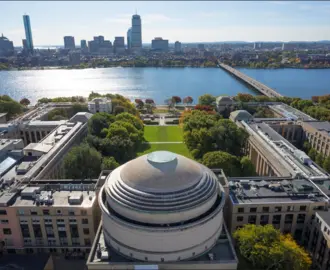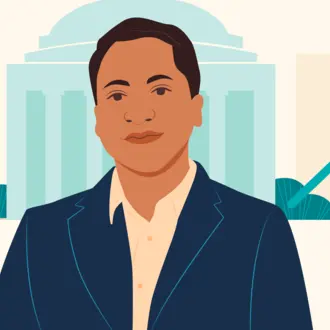Tarun Walia, SFMBA '22, is a biotech consultant from Ambala, India. He guides biotech companies in the areas of business strategy, research and development, marketing and branding, and mergers and acquisitions. He joined McKinsey as an associate partner after graduation. While you can also watch his most recent TEDx talk on the future of pharma, we spoke to him about his experience in the MIT Sloan Fellows MBA.
Tarun Walia, SFMBA '22
What prompted you to apply to the MIT Sloan Fellows MBA?
I’m a biotechnologist, and for the last 15 years I’ve been working at the intersection of business strategy, data analytics, and science. I wanted to be close to the center of that universe, and no place has that magic amalgam of machine learning, leadership, biotech, and entrepreneurial strategy that MIT does. Ultimately, the MIT Sloan Fellows MBA was the best way to access it all.
What was your strategy for this year at MIT?
The MIT Sloan Fellows MBA is very personal. How you use it is up to you, but my philosophy has been not to waste a second of my time here. I’m pursuing the Analytics certificate. I’ve joined both the Student Senate and the MIT Sloan Healthcare Club. And I collaborated with a Ph.D. student and an undergrad on a biotech startup dedicated to diseases with long-term effects, like COVID and Lyme disease. I’m also writing a white paper on sustainability in biotech with Jason Jay, director of the MIT Sloan Sustainability Initiative, and Sandor Schoichet, cofounder of the Biopharma Sustainability Roundtable and an MIT computer science alum.
Have you found the MIT faculty are there for you when you need them?
This is one of the most surprising things about the program for me—the faculty have been incredibly approachable. I’ve been able to work closely with Harvey Lodish, for example, who is a leading light in biotech. Working with him as a teaching assistant has been one of the greatest learnings of my life.
I’ve had similar experiences with Andrew Lo and SP Kothari in finance, Zeynep Ton in management of services, Nelson Repenning in leadership, and Duncan Simester in strategy—all are incredibly accomplished in their fields. As the Isaac Newton quote goes, “If I have seen further, it is by standing on the shoulders of giants.” In this program, we definitely stand on the shoulders of giants, and they are kind, helpful, collaborative giants who are here to help us succeed.
What is it like to work side-by-side for a year with such an international group?
In global business, you run into so many contextual geopolitical situations that you don’t understand—or, worse, you don’t know what you don’t know. As a Sloan Fellow MBA student, you can, now and forever, tap into the regional knowledge of classmates from 41 different countries who are on the ground in those areas.
But not just regional knowledge. Each MIT Sloan Fellow—and Sloan Fellow alum—is an expert in some professional realm, from private equity to healthcare. You can call upon an expert in almost every field or function. I have CFOs I can consult on budgetary issues and COOs on operational questions. We pool our knowledge.
The success of our peers is as important to us as our own success. We have a saying, “no Fellow left behind,” and you can verify that with any alum. MIT Sloan Fellows help one another for life. Even during my time in the program, alumni have been enormously helpful to me. Vijay D’Silva, MBA ’92, for example, an MIT Sloan alum, has helped me a ton with career advice. That is the beauty of the network, and now it will be our responsibility to pay it forward.
Have you learned something you didn’t expect to learn during the last year?
No doubt about it. This has been a transformational journey for me. I feel a sense of responsibility to the world. As someone who has been incredibly fortunate, I want to contribute to the good of the greater society. As we make scientific discoveries and deliver medical breakthroughs in the biotech industry, we also must ensure that we are focusing on health equity, global access, and our environment.
I always ask the guest speakers who come to MIT, “What would be your advice to your younger self?” Phil Reilly of Third Rock Ventures once answered, “Believe in yourself and always be kind.” That has stuck with me. What really matters? Staying grounded in our values. Always.



